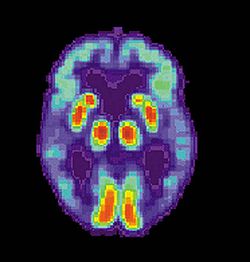Alzheimer's disease

Alzheimer's disease (AD) is the most common form of dementia among older people. Dementia is a brain disorder that seriously affects a person's ability to carry out daily activities.
Alzheimer's disease is "characterised by loss of neurons and synapses in the cerebral cortex and certain subcortical regions. This loss results in gross atrophy of the affected regions, including degeneration in the temporal lobe and parietal lobe, and parts of the frontal cortex and cingulate gyrus.[1] Some of the primary symptoms of alzheimer's disease are: memory problems, mood swings, emotional outbursts, brain stem damage which impairs function in the heart, lungs plus causes disruption of various other bodily processes.[2]
An abstract of the medical study entitled Measures to Assess the Noncognitive Symptoms of Dementia in the Primary Care Setting by Brent P. Forester, M.D. and Thomas E. Oxman, M.D. inidcated "Noncognitive symptoms associated with Alzheimer's disease and related dementias include psychosis, mood disturbances, personality changes, agitation, aggression, pacing, wandering, altered sexual behavior, changed sleep patterns, and appetite disturbances. These noncognitive symptoms of dementia are common, disabling to both the patient and the caregiver, and costly."[3]
According to the Center for Neuro Skills:
| “ | Kolb & Wishaw (1990) have identified eight principle symptoms of temporal lobe damage: 1) disturbance of auditory sensation and perception, 2) disturbance of selective attention of auditory and visual input, 3) disorders of visual perception, 4) impaired organization and categorization of verbal material, 5) disturbance of language comprehension, 6) impaired long-term memory, 7) altered personality and affective behavior, 8) altered sexual behavior.[4] | ” |
AD begins slowly. It first involves the parts of the brain that control thought, memory and language. People with AD may have trouble remembering things that happened recently or names of people they know. Over time, symptoms get worse. People may not recognize family members or have trouble speaking, reading or writing. They may forget how to brush their teeth or comb their hair. Later on, they may become anxious or aggressive, or wander away from home. Eventually, they need total care.
AD usually begins after age 60. The risk goes up as you get older. [5] Your risk is also higher if a family member has had the disease.
No treatment can stop the disease. However, some drugs may help keep symptoms from getting worse for a limited time.
Ronald Reagan famously suffered Alzheimer's disease in his later years.
Contents
Health effects of Alzheimer's disease
See also: Effects of Alzheimer's disease on the brain

(photo obtained from Wikimedia commons, see: license agreement)
An abstract of the medical study entitled Measures to Assess the Noncognitive Symptoms of Dementia in the Primary Care Setting by Brent P. Forester, M.D. and Thomas E. Oxman, M.D. inidcated "Noncognitive symptoms associated with Alzheimer's disease and related dementias include psychosis, mood disturbances, personality changes, agitation, aggression, pacing, wandering, altered sexual behavior, changed sleep patterns, and appetite disturbances. These noncognitive symptoms of dementia are common, disabling to both the patient and the caregiver, and costly."[6]
According to the Center for Neuro Skills:
| “ | Kolb & Wishaw (1990) have identified eight principle symptoms of temporal lobe damage: 1) disturbance of auditory sensation and perception, 2) disturbance of selective attention of auditory and visual input, 3) disorders of visual perception, 4) impaired organization and categorization of verbal material, 5) disturbance of language comprehension, 6) impaired long-term memory, 7) altered personality and affective behavior, 8) altered sexual behavior.[7] | ” |
Alzheimer's disease and prevention
See also: Alzheimer's disease and prevention
There are a number of suspected causes for Alzheimer's disease.[8] According to the Mayo Clinic, researchers believe for most people suffering from the disease, genetics, lifestyle, gender and environmental factors are possible contributers.[8]
After the age of 65, the chance of developing the disease double every five years. The Mayo Clinic reported that almost fifty percent of those people who are 85 years or older are affected.[9]
Lifelong learning and social engagement
The Mayo Clinic states that studies suggest that people who keep mentally and socially active during their lives may decrease their chances of developing Alzheimer's disease. Having a higher education, challenging employment, a mentally-stimulating hobby and an active social life may help reduce the risks. The connection hasn't been explained yet, but it may be because the brain develops more "cell-to-cell connections", thus reducing the impact of Alzheimer's damage.[9]
References
- ↑ http://www.news-medical.net/health/Neurodegeneration-in-Alzheimers-and-Parkinsons.aspx
- ↑ http://www.dementiacarecentral.com/node/559
- ↑ http://www.ncbi.nlm.nih.gov/pmc/articles/PMC419385/
- ↑ http://www.neuroskills.com/tbi/btemporl.shtml
- ↑ Hebert, LE; Scherr, PA; Bienias, JL; Bennett, DA; Evans, DA. “Alzheimer Disease in the U.S. population; Prevalence Estimates Using the 2000 Census.” Archives of Neurology. August 2003; 60 (8): 1119 –1122; National Academy on an Aging Society. “Alzheimer’s Disease and Dementia: A Growing Challenge.” September, 2000. Graphic used on page 7 of the National Alzheimer's Strategic Plan, March 25, 2009
- ↑ http://www.ncbi.nlm.nih.gov/pmc/articles/PMC419385/
- ↑ http://www.neuroskills.com/tbi/btemporl.shtml
- ↑ 8.0 8.1 Alzheimer's disease - causes, Mayo Clinic
- ↑ 9.0 9.1 Alzheimer's disease: risk factors mayoclinic.com, retrieved September 11, 2011
External links
- Alzheimer’s Association Official Website
- A National Alzheimer’s Strategic Plan: The Report of the Alzheimer’s Study Group, The National Alzheimer's Strategic Plan was released at a hearing before the U.S. Senate Special Committee on Aging on March 25, 2009.
